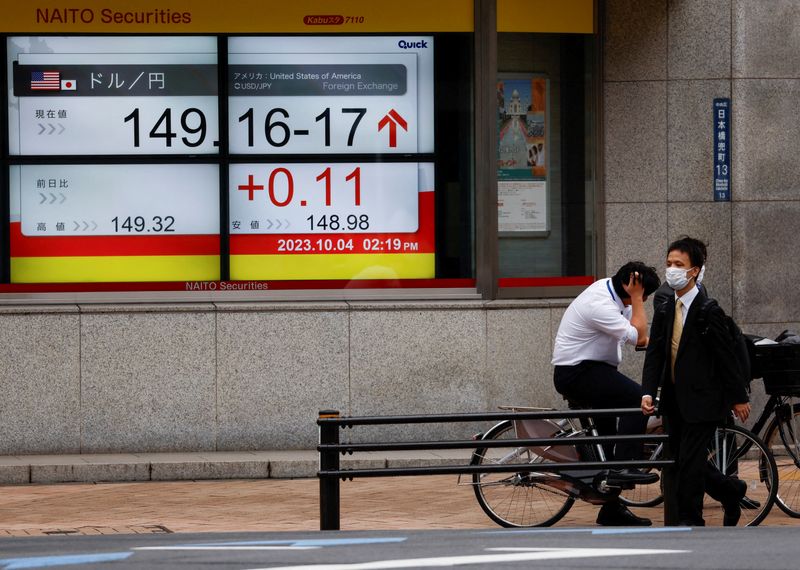Morning Bid: Markets bunker down as Iran-Israel tensions spark

By Jamie McGeever
(Reuters) - A look at the day ahead in Asian markets.
The final quarter of the year is under way, and the sense of caution that characterized its open on Tuesday could not be further removed from the ebullience and optimism that marked the end of the third quarter 24 hours earlier.
Investors fled risky assets like stocks for the safety of U.S. Treasuries, gold and the dollar as Iran fired a salvo of ballistic missiles at Israel on Tuesday in retaliation for Israel's campaign against Tehran's Hezbollah allies in Lebanon.
The S&P 500 and global stocks had their worst day in a month, the 10-year U.S. bond yield registered its steepest fall in a month, and oil rose 3%, after being up 5% at one stage.
On top of the escalation of tensions between Israel and Iran, the sense of gloom hanging over markets on Tuesday was heightened by the steep decline in a closely-watched tracking model estimate of U.S. GDP growth.
The Atlanta Fed's GDPNow model estimate for third quarter U.S. GDP growth on Tuesday was cut to 2.5% from 3.1% last week. The fall of six-tenths of one percent was the biggest decline since the Q3 tracking estimates was launched in late July.
This will set the tone on Wednesday for markets across Asia. Chinese markets are closed for Golden Week, and the major economic releases will be inflation and manufacturing purchasing managers index data from South Korea, and consumer confidence from Japan.
Although oil spiked sharply on Tuesday, the deeply negative year-on-year price of oil is a major reason why inflation around the world is cooling, and much faster than many economists and policymakers had expected.
In many cases, like the euro zone, inflation is already at or even below the 2% target that many central banks aim for. Figures on Wednesday from Seoul are expected to show that annual consumer inflation in South Korea eased to 1.9% in September from 2.0% in August.
That would be the lowest, and also the first time below that 2% threshold, since March 2021.
Japan's markets should be a little calmer on Wednesday, even though Nikkei futures point to a fall of more than 1% at the open, as the dust begins to settle on the major political upheaval of recent days.
Investors are getting used to what they might expect from new Prime Minister Shigeru Ishiba, once considered a monetary policy hawk who now appears to have softened his stance.
He said on Tuesday that he hoped the Bank of Japan would maintain loose monetary policy "as a trend", and that his administration will carry over the economic policy of former Prime Minister Fumio Kishida and "ensure Japan fully emerges from deflation."
Here are key developments that could provide more direction to Asian markets on Wednesday:
- South Korea inflation (September)
- South Korea manufacturing PMI (September)
- Japan consumer confidence (September)
(Reporting by Jamie McGeever)
Breaking news
See all






